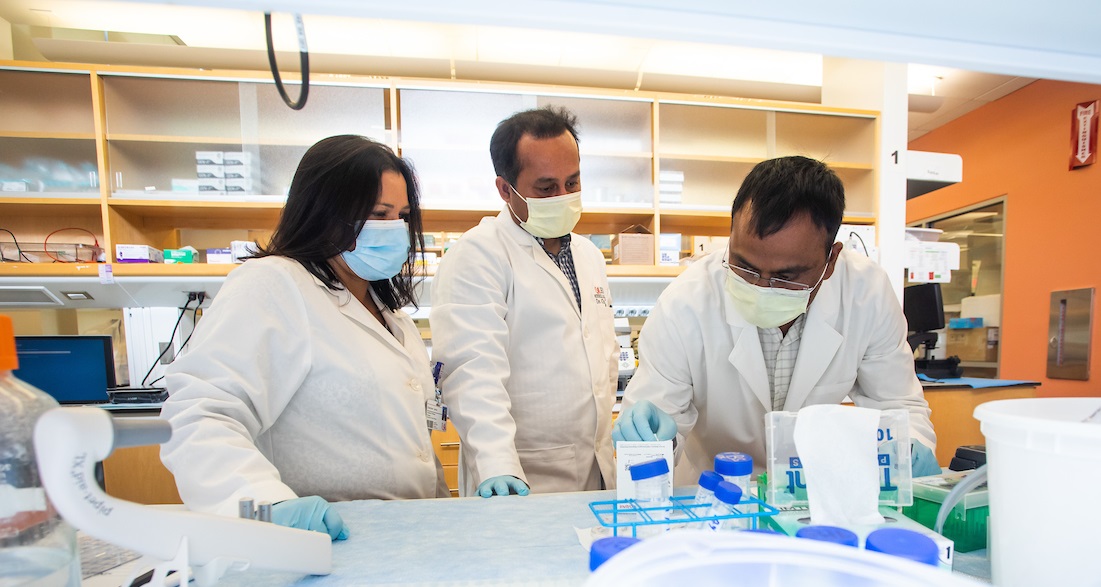 |
| The Clyde G. Huggins Award for Summer Research winners, from left, are Kahlea Haladwala, Wade Davis, Brandon Barnes, Rachael Motamed and Ryleigh Randall. |
The Whiddon College of Medicine announced the top oral and poster presentations from the 49th annual Summer Research Day, held July 22 in the Medical Sciences Building.
Ryleigh Randall, a second-year medical student, won the Clyde G. Huggins Award for Summer Research for her oral presentation “Brain Pericyte Dysfunction in Normal Aging.” Randall’s mentor was Amy Nelson, Ph.D., an assistant professor of physiology and cell biology.
Randall’s project sought to examine the impact of senescence, the arrest of the cell cycle as part of the aging process, on the function of pericytes, cells that surround tiny blood vessels in the brain and help regulate cerebral blood flow.
“As aging is the No. 1 risk factor for developing Alzheimer’s disease and is associated with other forms of damage to the cells of the brain, it is more important than ever to study the impact of normal aging processes on the cells in the brain,” Randall said.
Her project sought to determine if pericyte dysfunction proceeded via the p75 neurotrophin receptor, a protein associated with cellular injury, and if that dysfunction was made worse by the presence of amyloid beta proteins, which are associated with Alzheimer’s disease. The research found that senescent pericytes treated with amyloid beta oligomers were less viable and also expressed higher levels of p75 compared with untreated senescent pericytes.
“Our next steps for the study will include exposing senescent pericytes to a p75 agonist as well as performing cranial window surgeries on aged mice followed by live tissue imaging using a multi-photon microscope in order to measure red blood cell flow through pericyte-covered capillaries in real time,” she said.
The four poster presentation winners, all second-year medical students, were:
- Rachael Motamed: “Enhancing Wound Healing in Hyper-IGE Syndrome using FPRS as Targets”
- Kahlea Haladwala: “Correlation of Renal Bladder Ultrasound and Voiding Cystourethrogram in Pediatric Patients Hospitalized for Febrile Urinary Tract Infection”
- Brandon Barnes: “Blunt Cerebrovascular Injury (BCVI) Management: A Unicorn Diagnosis”
- Wade Davis: “Breast Cancer Disparities: Racial and Socioeconomic Connection of Molecular Subtypes”
Each winner received a plaque and a $100 prize.
Motamed’s project focused on creating a therapeutic option for patients with a rare, devastating pediatric disease, Hyper IgE syndrome, in which patients suffer from delays in wound healing, which leave them vulnerable to infection.
“Lung infections, in particular, are life-threatening for patients as infection causes tissue damage that doesn’t resolve, leading to reduced tissue function and susceptibility to further infections,” she said. “Effective therapeutic intervention that enhances wound healing could be more beneficial than any current treatment because this could interrupt the destructive cycle of tissue repair and immune dysfunction.”
Motamed said that new therapeutic options could apply to other diseases that involve wound healing deficiencies, such as acute lung injury and diabetes.
Haladwala worked with pediatrician Maria Roca Garcia, M.D., at USA Health Children’s & Women’s Hospital on finding correlations between different imaging studies used to assess patients with urinary tract infections (UTIs) and fever. “UTIs are the most common bacterial infection affecting young children today, and understanding how to best treat and manage these patients is very important,” she said.
Haladwala’s research investigated correlations between a common ultrasound finding of pelviectasis – when urine gathers in the kidney, making it appear larger than normal – and whether patients with this finding later received a diagnosis of vesicoureteral reflux (VUR), a condition in which urine moves backward in the urinary tract.
“Our conclusions encouraged further discussion on this topic and the importance of defining pelviectasis as an ultrasound finding so as to best clarify to pediatricians if further imaging is required in those patients,” she said.
Barnes’ research focused on the presence, management and outcomes of blunt cerebrovascular injury in trauma patients at USA Health University Hospital. Blunt cerebrovascular injury is a non-penetrating injury to the blood vessels that supply the brain with blood, mainly the vertebral arteries and internal carotid arteries. The most concerning outcome of these injuries is stroke caused by impaired blood flow to the brain.
“We set out to identify how many of the trauma patients at University Hospital over the past five years suffered this type of injury and experienced a stroke and/or had stroke-like symptoms as a result,” Barnes said. “We also wanted to identify what types of treatments were used for these patients ranging from drug therapy, arterial stents from interventional radiology, and surgical procedures while reviewing the results of any follow-up exams and imaging.”
Davis’ research began as a chart review of 1,200 patients treated for breast cancer at the USA Health Mitchell Cancer Institute between 2017 and 2022. The project classified the patients by body mass index (BMI), race, county of residence and breast cancer subtype to determine what populations were more at risk of developing breast cancer in Mobile and the surrounding area. The project also sought to determine who was more susceptible to triple-negative breast cancer, the most aggressive subtype.
“The results showed that individuals who were African American and had a higher BMI were more at risk of receiving a breast cancer diagnosis, and those same groups with the addition of individuals from lower income counties were most at risk for developing the most aggressive subtype of breast cancer,” he said.
The Clyde G. Huggins Award for Summer Research honors the memory of Clyde G. “Sid” Huggins, who served as the first dean of students at the Whiddon College of Medicine.
The Summer Research Program is an eight-week program that allows medical students to develop an appreciation of how research is needed to improve the prevention, diagnosis and treatment of diseases.
View more photos from Summer Research Day on Flickr.







